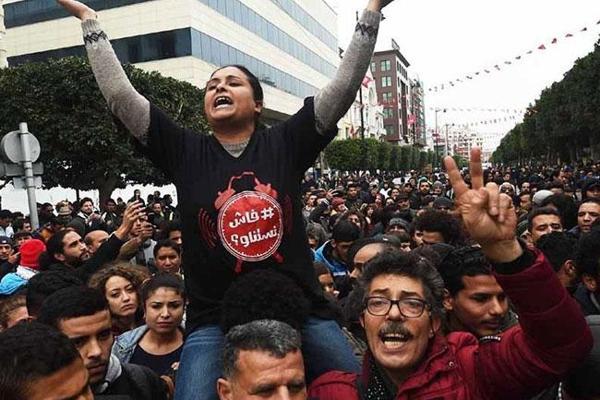Arrests, clashes persist in Tunisia amid price rises
TUNIS


Tunisian authorities arrested another 150 people including local opposition leaders on Jan. 12 over unrest against price and tax rises that prompted troop deployments to restive towns, and activists called for renewed rallies at the weekend.
Protests, some violent, flared across Tunisia on Jan 8, when one protester was killed, before ebbing on Jan 11. Protesters have burned dozens of state buildings, prompting the government to send the army into several cities and towns.
Activists and opposition politicians appealed for fresh demonstrations in the capital, Tunis, on Jan 12 and on Jan 14, the seventh anniversary of the toppling of authoritarian president Zine El-Abidine Ben Ali.
On Jan. 11, unrest was limited to sporadic clashes in the northern city of Siliana, in Sidi Bouzid in central Tunisia and Douz in the south of the North African country.
“The protests have declined and there was no damage, but last night the police arrested 150 people involved in rioting in the past few days, bringing the total number of detainees to 778,” Interior Ministry spokesman Khelifa Chibani said. Sixteen “Islamist extremists” were among those detained, he said.
Three local leaders of the Popular Front, the main opposition bloc, were detained in Gafsa for allegedly setting fire to a government building, a judicial source said.
The Popular Front said its leaders had been targeted in a political campaign that was “reproducing the methods of the oppressive Ben Ali regime.”
Party members had also been arrested in Mahdia and Karbariya, it said.
The protests draw on anger over price and tax increases included in this year’s budget that took effect on Jan. 1.
The government has blamed the opposition and “troublemakers” for stoking unrest, a charge the opposition has denied. The government has vowed not to back down on the austerity measures, taken to satisfy foreign lenders.
Prices have increased for fuel and some consumer goods, while taxes on cars, phone calls, the internet, hotel accommodation and other items have also gone up.
Tunisia appears to have little scope to back away austerity. The International Monetary Fund (IMF) says Tunisia is committed to “decisive action” to reform its economy before the IMF reviews the payment of its next loan tranche.
Turkish President Recep Tayyip Erdoğan, meanwhile, spoke via telephone with Tunisian leaders on Jan. 11 about the protests.
During the conversations with President Mohamed Beji Caid Essebsi and Prime Minister Youssef Chahed, Erdoğan stressed his belief that Tunisia would overcome its problems when it “stands united,” said the sources, who asked not to be named due to restrictions on speaking to the media.
Conveying his thanks over the hospitality during his last visit to Tunisia, Erdoğan also said the country’s gains following the Jasmine Revolution should not be harmed.
Tunisia was the last stop on Erdoğan’s three-nation African tour that also included Sudan and Chad in December 2017.
The three leaders also voiced their intent to further improve bilateral ties in every area.
